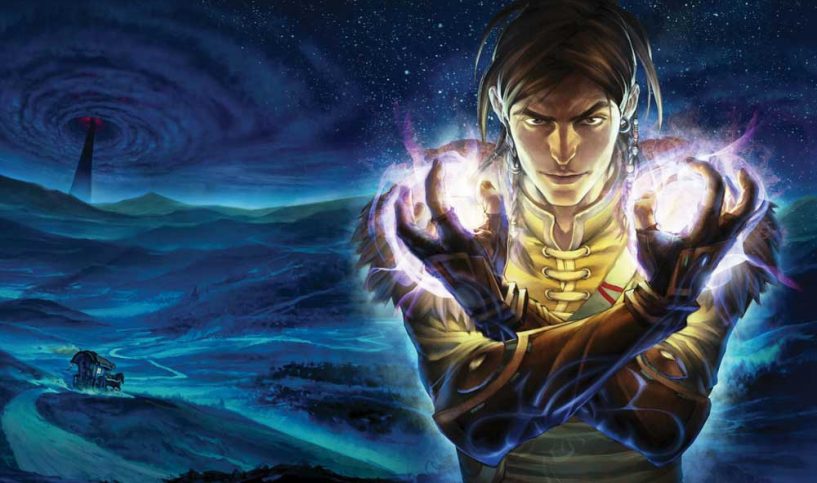by Jaye Sonia
Of all the console-based, role-playing games I’ve played, I think Fable is one of my favorites.
For one, it’s one of the first electronic games that really addressed the relationship between our moral choices and their outcome in direct ways. Every decision had a result, even when I couldn’t see them immediately, and those decisions determined who the hero became. It had moments of moral ambiguity, too; it made the player really think about what he wanted his hero to become.
If your character drank too much beer, he would get sick. If he ate too much, he’d get fat. If he committed evil acts, his appearance would shift – he’d become dark and demonic in appearance. Alternately, if he committed himself to good and performed good actions, he’d gradually become more noble in appearance. Every action the Hero of Oakvale performed had consequences – sort of like in real life. Of course, while this game was based on fantasy, the underlying theme was the same. If you wanted to be a hero, you had to do heroic things.
Let’s say that again while I change the tense ever so slightly.
If you want to be a hero, you have to do heroic things.
That’s not a bad message if you ask me.
A lot of the issues Fable addressed were ones we face on a daily basis. The Hero of Oakvale had opportunities to spread rumors, steal from others, and even be sexist. There were plenty of opportunities for him to take the low road. But he also had a chance to stand up for those weaker than him, help the poor, and save those who couldn’t save themselves. And in most battles, the hero could choose to spare his enemy after he defeated him. Sure, there was still a lot of opportunity to slay the minions of evil (it is a fantasy after all); but just as many opportunities to make noble decisions, as well. Sure, sometimes you had to stand up and fight. Other times, you had to encourage others to simply help themselves. It was a fun game and, like a lot of games that came after it, allowed players to play through it several times, achieving different outcomes. As far as games go, you could get a lot of mileage out of it.
But the message I took home was something subtle and simple. It reminded me that being a hero started at home.
That’s not a message we receive very often, either. Sure, the movies sell us plenty of extraordinary folks who have just the right will, just the right talents, and just the right sort of circumstances to save the world from invading aliens led by evil gods. Or maybe they fight old villains who, in their past, they helped to create. But they’re almost invariably the recipient of special powers, technology, or wealth – they have the tools at their disposal to fight the bad guys. Very few of them, sadly, are simply heroes just because.
Think about all of the things we’re faced with on a day to day basis. Racism, sexism, intolerance, dishonesty, theft, and even road rage (it’s the 30, after all) – think about all of our chances to be bigger, better people. Think about your opportunities to be a hero. Being a hero isn’t just about your reaction to these things, either. It’s also about being proactive, and when possible, being the person that isn’t provoking the negative in others. Maybe you slow down on the 30 and don’t do that “Get-out-of-my-way-I’m-more-important-than-you” thing with your headlights or maybe you stop to let someone cross the street instead of pushing them to one side. Maybe you say “hi” to the guy or girl who makes your coffee or tea in the morning. Maybe, when you’re maid is done cleaning, you simply say “thank you.”
Our mentalities go a long way, too. How we think about things generally determines how we act when faced with problems. However, that doesn’t mean we can’t shift our thinking. Maybe we stop and ask ourselves what our inner hero would do. How do we envision heroes thinking about them? Do we take the noble path or do we take the easy path? Do we stick up for others, even when they’re not around to hear it, or do we go with the flow?
What if November, at least for you and I, were, “think like a hero month”? What if we woke each day and said, “You know, today I’m going to just do something good”? And what if, over the course of November, we each changed a few things – even if they’re small things – that made someone’s life better? What if those actions rippled outward, empowered others, and just like the game Fable – we slowly became heroes ourselves. Wouldn’t that be good?
So, what’s stopping us? Who says we can’t? Why not turn November into the first of many months where each of us makes those small, heroic changes?
Let us – regardless of what others think – turn November into “Think like a Hero” month. Let’s care for an animal, donate some of our time to the poor, give someone a ride, or even just polish up our manners. Let’s treat everyone with respect. Let’s toss marginalization right out of the window! Let’s be heroes!











